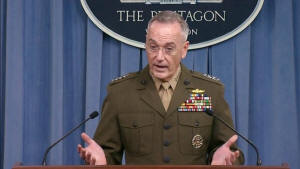|
Top U.S. military officer seeks to
address criticism of fatal Niger operation
 Send a link to a friend
Send a link to a friend
 [October 24, 2017]
By Idrees Ali [October 24, 2017]
By Idrees Ali
WASHINGTON (Reuters) - The top U.S.
military officer sought on Monday to tamp down criticism the Pentagon
had not been forthcoming about the death of four U.S. soldiers in an
ambush in Niger, providing a timeline of the incident and acknowledging
unanswered questions remained.
General Joseph Dunford, chairman of the U.S. military's Joint Chiefs of
Staff, told reporters that the United States Africa Command was
conducting an investigation into the Oct. 4 attack. Some lawmakers have
criticized the Pentagon for being slow to provide answers.
Dunford acknowledged that a number of issues were still under
investigation, including why U.S. forces on the ground waited an hour
until they called for support, what type of intelligence was used in the
mission and why it took as long as it did to recover a U.S. soldier's
body.
"There has been a lot of speculation about the operation in Niger and
there's a perception that the Department of Defense has not been
forthcoming and I thought it would be helpful for me to personally
clarify to you what we know today, and to outline what we hope to find
out in the ongoing investigation,"

Dunford said in an hour-long news conference.
U.S. President Donald Trump’s handling of condolence messages to the
families of the dead soldiers has been criticized by lawmakers in
Washington and has raised the profile of the deadly incident.
Dunford said for the first time that U.S. forces on the ground in Niger
waited an hour before calling for support.
Within minutes, a U.S. drone located nearby was moved over the firefight
and provided intelligence and full-motion video.
French fighter jets arrived above the scene about an hour after that,
said Dunford.
"It is important to note that when they didn't ask for support for that
first hour, my judgment would be that that unit thought they could
handle the situation without additional support," Dunford said.
The French fighters did not drop bombs when they arrived, something
Dunford said was under investigation.
QUESTIONS FROM LAWMAKERS
Republican John McCain, chairman of the Senate Armed Services Committee,
said last week he may consider issuing a subpoena because the White
House had not been forthcoming with details of the attack.

On Monday, McCain said lawmakers were getting cooperation and
information from the Pentagon and expected a "formal hearing" on
Thursday about the ambush.
The attack threw a spotlight on the little-known counterterrorism
mission in the West African country, which has about 800 U.S. troops,
out of a total of 6,000 U.S. troops in Africa. The United States says it
is there to support Niger in fighting Islamist extremists.
The Pentagon said at the time that three soldiers had been killed in the
ambush. The body of a fourth soldier, Sergeant La David Johnson, was
recovered about two days later.
[to top of second column] |

U.S. Joint Chiefs of Staff Chairman General Joseph Dunford is seen
in a frame grab from U.S. Department of Defense video as he speaks
to the media about the deaths of four U.S. Army special operations
forces soldiers in Niger during a news conference about the attack
at the Pentagon in Washington, U.S. October 23, 2017. U.S.
Department of Defense/Handout via REUTERS

Dunford said that on Oct. 3, a dozen U.S. soldiers accompanied 30
Nigerien forces on a reconnaissance mission near the village of
Tongo Tongo.
After spending the night near the village, the forces were moving
back to their base when they came under attack from about 50 enemy
fighters, who appeared to be from a local Islamic State affiliate.
The militants attacked with small arms and rocket-propelled
grenades, Dunford said.
"It was planned as a reconnaissance mission," Dunford said. "What
happened after they began to execute, in other words, did the
mission change? That is one of the questions that's being asked," he
said.
CONSIDERED A LOWER-RISK MISSION
The mission had been seen as a relatively lower-risk endeavor for
elite U.S. commandos and there was no armed air cover at the time
that could carry out air strikes if necessary.
He added there was no indication the soldiers had taken too many
risks.
"I don't have any indication right now to believe or to know that
they did anything other than operate within the orders they were
given," Dunford said.
U.S. forces were conducting normal operations in Niger again and the
plan was for them to continue to train and advise local partners.
Dunford said there had been no discussions about increasing U.S.
troops.

A controversy has swirled for a week over how Trump has handled the
task of consoling relatives of slain service members.
Myeshia Johnson, the widow of the Army sergeant killed in Niger,
said on Monday that Trump had "made me cry even worse" in a
condolence call when he said her husband "knew what he signed up
for."
“We owe the families as much information as we can find out about
what happened, and we owe the American people an explanation of what
their men and women were doing at this particular time," Dunford
said.
(Reporting by Idrees Ali; Additional reporting by David Alexander,
Eric Walsh and Amanda Becker; Editing by Tim Ahmann and Peter
Cooney)
[© 2017 Thomson Reuters. All rights
reserved.]
Copyright 2017 Reuters. All rights reserved. This material may not be published,
broadcast, rewritten or redistributed.
 |